Filter by
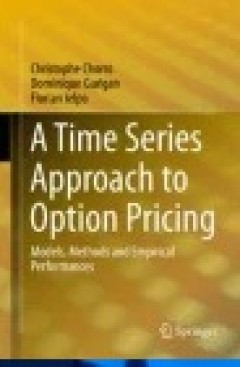
A Time Series Approach to Option Pricing: Models, Methods and Empirical Perfo…
The current world financial scene indicates at an intertwined and interdependent relationship between financial market activity and economic health. This book explains how the economic messages delivered by the dynamic evolution of financial asset returns are strongly related to option prices. The Black Scholes framework is introduced and by underlining its shortcomings, an alternative approach…
- Edition
- Ed. 1
- ISBN/ISSN
- 978-3-662-45037-6
- Collation
- XVI, 188
- Series Title
- -
- Call Number
- 332 CHO t
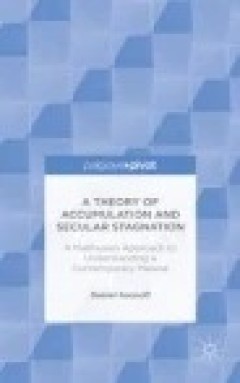
A Theory of Accumulation and Secular Stagnation
Thomas Malthus identified a crucial tension at the heart of a market economy: While an accumulation of wealth is necessary to provide the capital investment needed to generate growth, too much accumulation will cause planned saving to exceed profitable investment, which will result in secular stagnation, a condition of low growth and underemployment of resources. Keynes drew inspiration from Ma…
- Edition
- Ed. 1
- ISBN/ISSN
- 978-1-137-56221-0
- Collation
- VIII, 136
- Series Title
- -
- Call Number
- 332 ARO t
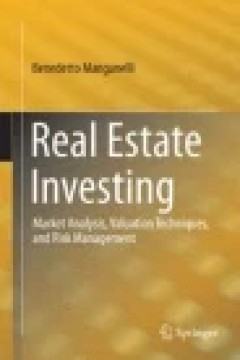
Real Estate Investing: Market Analysis, Valuation Techniques, and Risk Manage…
This book describes in full the major approaches used to evaluate investment in real estate and shows how theory informs decision-aid methods and tools to support such evaluation. The inclusion of numerous examples makes it also a practical guide to assessing the suitability of an investment property. The first part of the text is devoted to an analysis of the housing market through the stud…
- Edition
- -
- ISBN/ISSN
- 978-3-319-06397-3
- Collation
- -
- Series Title
- -
- Call Number
- 332
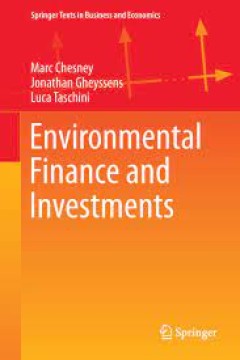
Environmental Finance and Investments
This textbook provides an introduction to environmental finance and investments. The current situation raises fundamental questions that this book aims to address. Under which conditions could carbon pricing schemes contribute to a significant decrease in emissions? What are the new investment strategies that the Kyoto Protocol and the emerging carbon pricing schemes around the world should pro…
- Edition
- -
- ISBN/ISSN
- 978-3-662-48175-2
- Collation
- 36 b/w illustrations, 36 illustrations in colour
- Series Title
- -
- Call Number
- -

A History of Digital Currency in the United States: New Technology in an Unre…
This book presents detailed case studies of the first commercial internet digital currency systems developed between 1996 and 2004. Transactions completed with the new technology circumvented all US financial regulations, an opening that transnational criminals exploited. Mullan explains how an entire industry of companies, agents, and participants turned a blind eye to crimes being committed i…
- Edition
- Ed. 1
- ISBN/ISSN
- 978-1-137-56870-0
- Collation
- -
- Series Title
- Palgrave Advances in the Economics of Innovation and Technology
- Call Number
- 330 MUL h
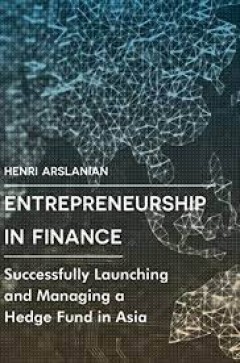
Entrepreneurship in Finance Successfully Launching and Managing a Hedge Fund…
Thinking of launching your own hedge fund? Want to learn more about the different steps involved in setting up and scaling a hedge fund? Want to understand what are the global best practices in order to grow your existing hedge fund and attract institutional investors? This book is the first hands-on publication to set out in concrete and practical terms the various steps and considerations…
- Edition
- -
- ISBN/ISSN
- 978-3-319-43913-6
- Collation
- 2 b/w illustrations, 19 illustrations in colour
- Series Title
- -
- Call Number
- -
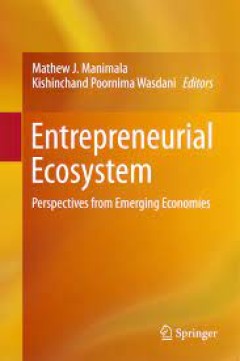
Entrepreneurial Ecosystem Perspectives from Emerging Economies
Economic development is a priority for all nation-states, whether developing or developed. In recent times, a few among the developing nations – often referred to as the emerging economies – have attracted the world’s attention because of their fast pace of economic growth. While the similarities among these nations (for example the BRICS) in the pattern of their economic growth are highl…
- Edition
- -
- ISBN/ISSN
- 978-81-322-2086-2
- Collation
- 42 b/w illustrations
- Series Title
- -
- Call Number
- -
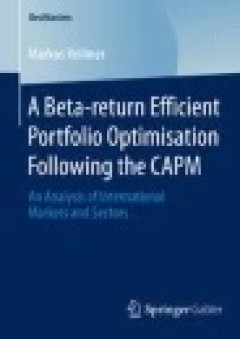
A Beta-return Efficient Portfolio Optimisation Following the CAPM: An Analysi…
Investors are trying to generate excess returns through active investment strategies. Since the outbreak of the financial crisis, investors face a situation where increased risks are accompanied by falling key interest rates. An optimal portfolio in terms of risk and return becomes a perpetual motion machine. Markus Vollmer answers the question how the seemingly impossible could still be achiev…
- Edition
- -
- ISBN/ISSN
- 978-3-658-06634-5
- Collation
- -
- Series Title
- BestMasters
- Call Number
- 658.155 VOL b
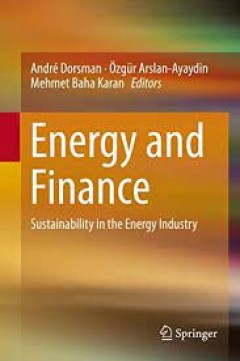
Energy and Finance Sustainability in the Energy Industry
This book analyses how socially responsible investments as well as the rising importance of Islamic finance are linked to the shift towards renewable energy. Academics and practitioners in the field take a global perspective and present case studies from several countries. The book is divided into three parts: The first part sheds new light on the energy shift towards renewable energy. The seco…
- Edition
- -
- ISBN/ISSN
- 978-3-319-32268-1
- Collation
- 6 b/w illustrations, 13 illustrations in colour
- Series Title
- -
- Call Number
- -

Energy Technology and Valuation Issues
This volume investigates the impact of energy technology innovations on economic development and presents new areas of research into the financial economics of energy as well as new studies into valuation, electricity pricing and the economic, regulatory and environmental costs of alternative energy sources. Academics and practitioners take a global perspective and present cases from several co…
- Edition
- -
- ISBN/ISSN
- 978-3-319-13746-9
- Collation
- 37 b/w illustrations, 2 illustrations in colour
- Series Title
- -
- Call Number
- -
 Computer Science, Information & General Works
Computer Science, Information & General Works  Philosophy & Psychology
Philosophy & Psychology  Religion
Religion  Social Sciences
Social Sciences  Language
Language  Pure Science
Pure Science  Applied Sciences
Applied Sciences  Art & Recreation
Art & Recreation  Literature
Literature  History & Geography
History & Geography